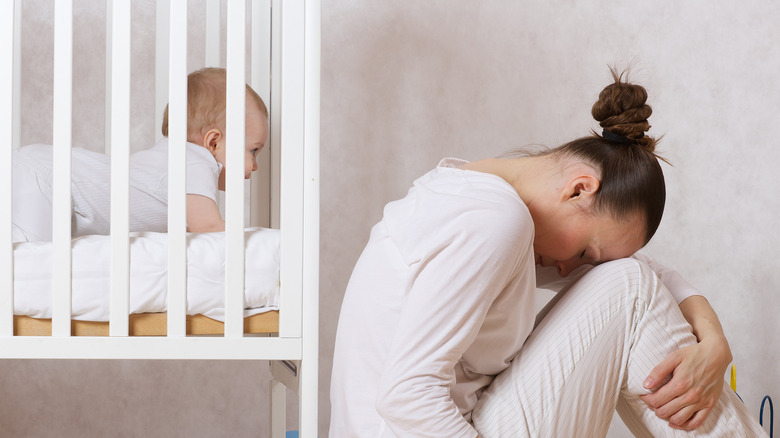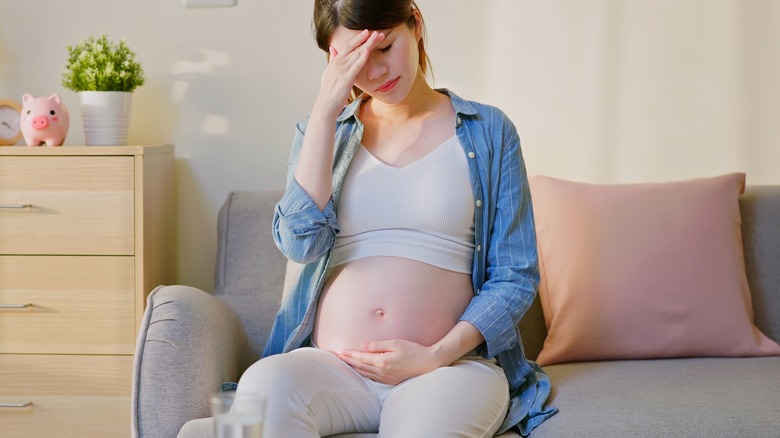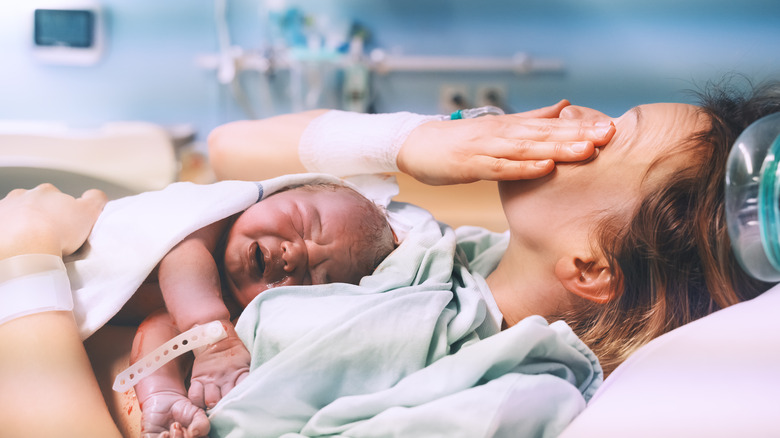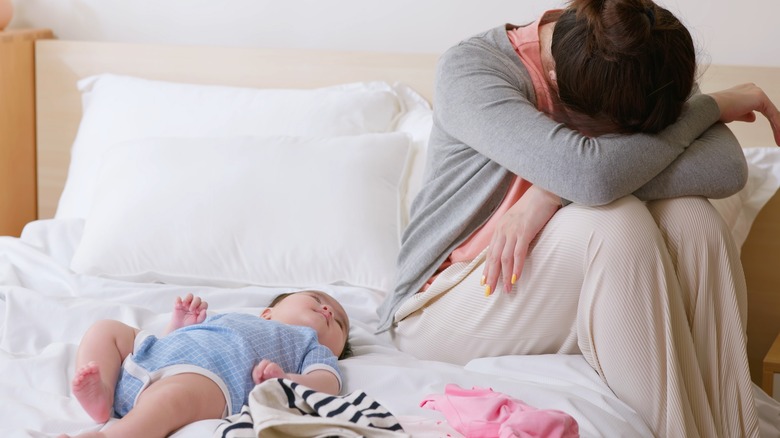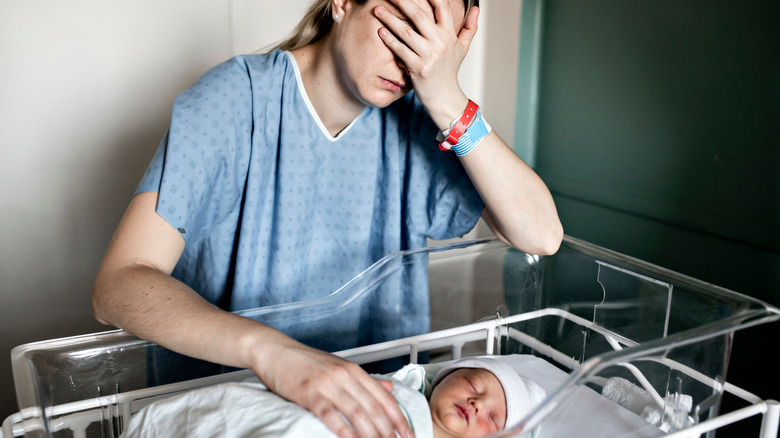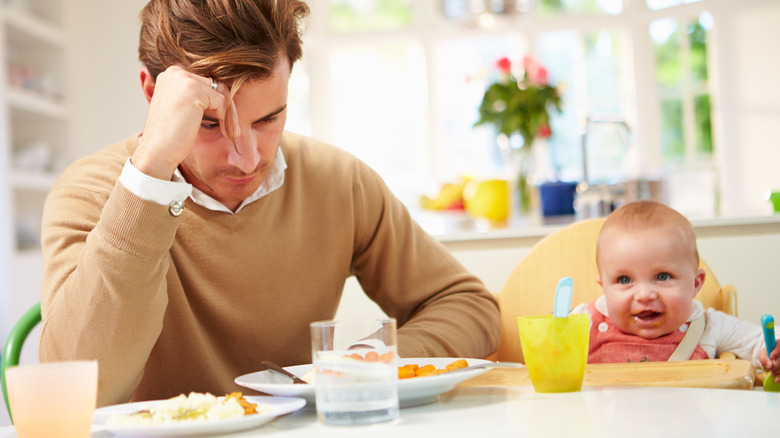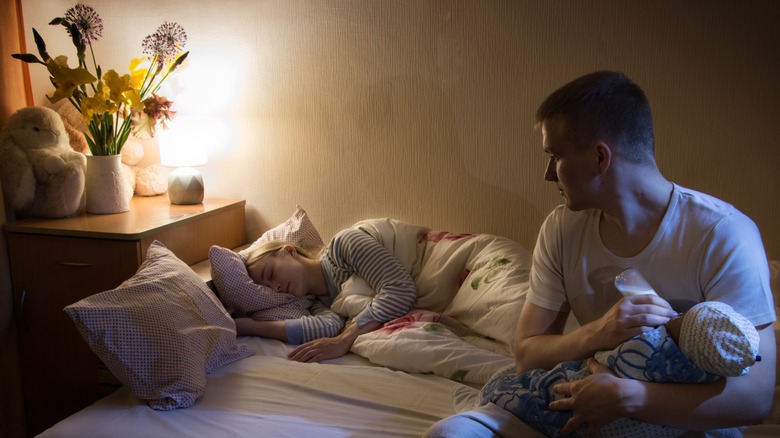Your Guide To Navigating Postpartum Depression
Becoming a new mom is supposed to be one of the most joyful times in a person's life, a time to take in all the little fleeting moments and soak up the adventure of having a new family member to get to know. However, for one in one in nine women experiencing postpartum depression (via CDC), this is not the case. Postpartum depression, also known as PPD, although treatable, can take many women (and sometimes men) by surprise and make simple day-to-day activities difficult to complete.
So what exactly is postpartum depression? According to the CDC, postpartum depression is "a serious mental illness that involves the brain and affects your behavior and physical health" and typically occurs after childbirth. It is "not a regular or expected part of being a mother." For many mothers, postpartum depression comes with feelings of despair after giving birth, making it difficult to bond with their baby.
Rachel Diamond, Ph.D., a clinical training director and assistant professor in couple and family therapy at Adler University, says postpartum depression is a "perinatal mood and anxiety disorder that both moms and dads can experience." In addition, "it's important to consider how depressive symptoms present in the context of the competing demands of the postpartum period," Diamond told us. With so much misinformation surrounding postpartum depression, we have developed an expert-based guide to help you understand the facts and demystify the condition.
Postpartum depression symptoms can start during and after pregnancy
Carrying a baby for nine months is both physically and mentally exhausting, and according to the experts, postpartum depression symptoms can start to creep up during pregnancy. Dr. Charissa Chamorro, a clinical psychologist specializing in parenting, says, "postpartum depression is a type of major depressive disorder that occurs during pregnancy or in the weeks or months following delivery."
Suppose you randomly sob when watching a fabric softener commercial while pregnant or after childbirth. In that case, you might wonder if your hormones are messing with you or if you are experiencing symptoms of postpartum depression. According to clinical therapist Rachel Diamond, postpartum symptoms are longer lasting and include: "Feeling restless, sad, or hopeless, excessive crying, difficulty bonding with baby, little to no energy or motivation, disturbances in appetite or sleep (for example, unable to sleep even when the baby sleeps), difficulty focusing, feelings of worthlessness, guilt, or like a bad parent, difficulty feeling joy, intrusive thoughts and you may have passive or active suicidal ideation."
Dr. Chamorro told The List that the "pre- and postpartum period are times of incredible transformation." She advocates that women practice self-care during this time. "Take extra care of yourself and your needs. Connect with others, nurture your body, and ask for help. You have created a new life. So take the time to nurture yours," she advises new moms.
There are many reasons why women experience postpartum depression
So why does something so difficult happen at such a wonderful time? According to the experts, postpartum depression can affect moms and dads for various reasons. Daily life stresses like work and endless chores can be challenging enough, but having to deal with the added responsibility and financial pressure of looking after a baby can impact a woman's mental health, particularly when the body is experiencing so many changes at the same time. Clinical psychologist Dr. Charissa Chamorro told The List: "Women experience an acute change in hormones following the birth of a child. These physiological changes can lead to mood disturbances," says Dr. Chamorro. She adds: "These physiological changes are also accompanied by significant physical changes in the body, a major shift in the family unit, increased responsibilities, and an extreme lack of sleep due to the demands of caring for an infant."
The change of pace and feelings of isolation while caring for a newborn means many moms question who they are and their societal role. Clinical therapist Rachel Diamond says, "Pregnancy and postpartum also include significant changes to one's identity, and there are often mismatches between people's expectations and reality. This can cause anxiety, disappointment, and distress."
Sometimes postpartum depression is confused with baby blues or major depression
When you plan to be a new mom, you think about everything you need for the baby, a new nursery, a car seat, a stroller – but no one ever prepares you for the emotional rollercoaster that will follow childbirth. Understanding the symptoms of mental health issues that can arise after having a baby is overwhelming. As a result, many new moms feel down or uneasy. Clinical psychologist Dr. Charissa Chamorro told The List that it is "completely normal for women to experience feelings of sadness and anxiety immediately after giving birth." Dr. Chamorro explains that the reason for this is that "the body goes through a tremendous transition, and this can leave a woman feeling exhausted and depleted."
According to Dr. Chamorro, most women begin to feel an improvement in mood and physical well-being within two weeks after giving birth. In addition, feelings of sadness, anxiety, and tearfulness experienced during the baby blues are mild compared to major depression or postpartum depression. However, "If a woman is still experiencing significant feelings of sadness, hopelessness, low self-worth, difficulty concentrating, and feelings of guilt more than two weeks after birth, it may be major depression with peripartum onset (Postpartum Depression)," says. Dr. Chamorro.
Some women are more susceptible to postpartum depression
While all new mothers have a lot on their plate, it's hard to know who postpartum depression is most likely to impact. "Women with a history of depression are at a much greater risk of developing major depression during pregnancy or in the weeks following pregnancy," Dr. Chamorro told The List. However, she adds that "women with significant life stress and minimal social support are also more likely to develop major depression during the postpartum period."
Up to 45% of new mothers have reported experiencing birth trauma (via Journal of Perinatal Education). According to Chicago-based clinical therapist Rachel Diamond, women who experience a traumatic birth are at an increased risk of developing mental health difficulties such as postpartum depression. "A traumatic childbirth can include physical traumas, but importantly involves psychological traumas in which the person giving birth experiences feelings such as intense fear, helplessness, and loss of control during a time of incredible vulnerability," says Diamond.
There are ways to reduce your chances of postpartum depression
When you are an exhausted new mom, the last thing you want to do is open up your schedule to social outings or invite people over. However, surrounding yourself with caring people will help you get the much-needed respite you need, and talking to adults after days of cooing and blowing raspberries on a newborn's tummy might save your sanity. Clinical therapist Rachel Diamond says, "Ways to reduce the risk of developing depressive symptoms include asking for and accepting support from trusted people in your support network so you can engage in self-care, including getting adequate sleep, proper nutrition, and engaging in physical activities appropriate for your stage of pregnancy or postpartum healing."
Self-care can help reduce the symptoms of postpartum depression. However, many moms are unaware of the importance of looking after themselves and might have to reframe how they see self-care routines. "Self-care does not mean you are putting yourself before your baby. Self-care means you are taking care of yourself so you can also take care of your baby," Diamond told The List. She also added that therapy could help. "If you know you are at higher risk for developing postpartum depression, you can engage in therapy when trying to conceive or during pregnancy to begin developing coping skills to help with the transition to parenthood. Therapy does not have to be reactive; instead, it can be used as a proactive measure," says Diamond.
Women should seek help early if they experience postpartum depression
Like all medical conditions, early intervention is the key to alleviating the symptoms of postpartum depression. "The most important thing you can do if you are experiencing symptoms of depression after giving birth is to get help," Dr. Chamorro told The List. Unfortunately, for many moms reaching out for help is not easy as they feel like they should have it all worked out and social media depictions of "perfect new moms" don't help.
Dr. Chamorro says an obstacle to seeking the necessary help is that many women feel isolated and ashamed of their feelings. "They [new moms] believe they should be happy, grateful, and ecstatic with motherhood. While many of these feelings do come with motherhood, it is also normal to feel overwhelmed, sad, and anxious. Feeling these feelings in isolation only makes them worse. If you are feeling sad, anxious, or overwhelmed, reach out to a friend, join a new mom's group, or connect with a therapist. It is also crucial that you take care of your own needs," she adds.
Dads can be impacted by postpartum depression too
While moms carry most of the responsibilities of looking after a newborn, the impacts of dealing with a complete lifestyle change can take its toll on men too. With many dads waking up in the middle of night and feeling the financial burden of dealing having a new member of the family, it's not surprising that this period of change would also impact the mental health of men. According to a 2010 scientific meta-analysis, research shows that "prenatal and postpartum depression was evident in about 10% of men in the reviewed studies." Dr. Chamorro, who is an expert in parental healthcare told The List that "The experience of having a child is an enormous transition for both parents. The challenges of caring for a newborn can include increased stress, increased financial demands, less time for self-care and leisure activities, and significantly less sleep. These factors can impact both parents, regardless of sex."
In addition, according to Dr. Chamorro if a father has a female partner with postpartum depression, this can also increase stress in the relationship and in the family unit as a whole. "For this reason, if one partner has Major Depression during the postpartum period, I always encourage both partners to get support and seek professional help," advises Dr. Chamorro.
Social interaction can help moms overcome postpartum depression
When your stomach cramps, and you've been up all night dealing with a tiny human, you probably don't want to interact with people. Being a new mom can be stressful, especially when you don't understand what that loud cry from that tiny mouth means, especially after trying almost a million different things to make it stop. You probably feel like you're tackling the whole world on your own — but it doesn't have to be this way. Dr. Charissa Chamorro, a clinical psychologist specializing in parenting, told The List that "women who have strong social support are less likely to develop major depression during the postpartum period."
Support from family members and friends is critical to avoid depression and unwanted feelings toward your baby. To combat depressive thoughts, Dr. Chamorro recommends seeking out mom groups to share your experiences: "when women can share their experiences with others, they may feel less isolated and more equipped to handle the challenges of parenthood," she says.
Accepting kind offers of help is another excellent way to ensure your needs are met as a new mom. "If a mother has help caring for her newborn, help with meals, and an opportunity to sleep, all of these things can decrease stress and provide the mother with an opportunity to heal and adjust to the tremendous physical and emotional changes that occur after birth," Dr. Chamorro told The List.
Excercise and a healthy diet may help your brain recover faster
When you're up all night feeding your child and indulding your postpartum cravings because you are sleep deprived, exercising and a healthy diet may seem to be something you will tackle in the far future. However, a healthy diet and exercising can be the key to avoiding postpartum depression. According to a 2010 study, exercise has significant benefits in easing postpartum depression. Even stroller walking benefited women experiencing depressive symptoms (via The Journal of Midwifery and Women's Health).
Just like exercising, a healthy diet can also have a positive impact. According to Ashley Kitchens, a registered nutritionist and plant-based dietitian: "Your stomach feeds your brain. If you're not eating properly, that can further hinder your brain's ability to function well. While food doesn't cure depression, there are some key foods to pay attention to help support your brain." Kitchens recommends omega-3-rich foods for their mental health benefits and says: "Foods like avocados, walnuts, and even seeds like hemp, chia, and flax can support brain function and reduce symptoms related to depression. Walnuts are one of the top plant-based sources of omega-3 fatty acids." In addition, Kitchens recommends dark leafy greens, which are rich in nutrients that can benefit the brain, and berries that are rich in antioxidants. However, she says creating a well-balanced diet is vital: "The brain is best supported by a healthy mix of nutrients coming from a variety of foods," Kitchens told The List.
Prioritzing sleep can be a game changer for those experiencing postpartum depression
According to a 2010 study, lack of sleep affects our physical and mental health. Although new moms might not realize it, prioritizing sleep have a positive impact on mood and aid those experiencing postpartum depression.
However, no mother can ever tackle sleep deprivation alone; it's essential for mothers of young children to reach out for support from family members and partners. "Caring for a newborn is a lot of work, and new mothers are in a state of physical recovery immediately after giving birth," says clinical psychologist Dr. Chamorro. For this reason, she recommends new moms get help caring for their newborns. "Help with meals, and an opportunity to sleep, all of these things can decrease stress and provide the mother with an opportunity to heal and adjust to the tremendous physical and emotional changes that occur after birth," clinical psychologist Dr. Chamorro told The List. So if your loved ones want to see you flourish as a new mom and your partner wants to see you in a better mood, tell them to look after your little one for a while and catch some much-needed Zs.
In case of crisis, the National Maternal Mental Health Hotline was launched in 2022. Any new parent can call or text 1-833-943-5746 (1-833-9-HELP4MOMS) 24/7 and receive free, confidential support from maternal mental-health trained professionals through Postpartum Support International.
